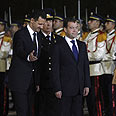
Medvedev was greeted at the presidential palace on Monday with full pomp and ceremony before going straight into talks with President Bashar Assad ahead of an official dinner, Syrian state television reported.
Medvedev, speaking alongside his host, said he hoped "to develop the political dialogue and economic and cultural cooperation" between the two nations.
He voiced confidence "in the capacity of the two countries to resolve international and regional problems."
Earlier in an interview with a Syrian daily, Medvedev called Damascus "one of the most important political centers of the Middle East" and urged the two countries to develop economic ties, particularly in the hi-tech sector.
Russia seeks to promote itself as a major power in the Middle East and wants to revive ties with old allies with whom relations weakened after the 1991 disintegration of the Soviet Union.
Assad for his part urged Moscow to help in efforts to denuclearize the Middle East and hailed the "great efforts undertaken by Russia for the peace process."
"Syria backs efforts for the non-proliferation of arms and strategic weapons in the Middle East," Assad said, according to the Sana news agency.
Urging Russia to "contribute to help make the Middle East a denuclearized zone," Assad also underscored the need for "a diplomatic solution to the Iranian nuclear program," held in suspicion by the West.
Europe and the United States have long accused Iran of seeking to develop nuclear weapons under the guise of its civilian nuclear energy program, a charge Tehran denies.
Assad rejected any "military adventure (in Iran over its nuclear program) as it will have catastrophic consequences in the region and the whole world."
Before leaving Moscow, Medvedev, who is accompanied by a high-powered delegation focused on the military, described Damascus as a key political player in the Middle East.
'Growing role' in Middle East
Medvedev's visit comes shortly after Washington renewed US sanctions on Syria for a year, accusing it of supporting "terrorist" groups.
Syrian media have welcomed the visit, with government newspaper Tishrin on Monday hailing Russia's "growing role" in the Middle East, especially in the context of Washington's "failure to protect stability and world peace, because of its flagrant bias" towards Israel.
Medvedev's visit "is of exceptional importance," the paper said.
Along with the European Union, United Nations and United States, Russia is a member of the international quartet seeking peace in the Middle East and has long lobbied to host a Middle East peace conference.
Analysts say Moscow's influence in the Middle East will largely depend on ties with Syria – a staunch ally of Iran and the Lebanon's Hezbollah group, and where the Palestinian group Hamas has its political headquarters.
Moscow has close ties with Hamas which the United States considers a terrorist group, and Medvedev is also expected to discuss sanctions against Iran and US pressure on Syria.
"Russia will seek to reduce pressure around Syria," said Alexander Shumilin, head of the Middle East Conflicts Analysis Center at Russia's US and Canada Institute.
Syria, one of the few countries to back Russia in its war with Georgia in 2008, is a major purchaser of its arms.
Sergei Prikhodko, Medvedev's top foreign policy aide, said military cooperation would be on the agenda during the visit.
The Kremlin chief is accompanied to Damascus by the president of Russian warplane maker Irkut, Oleg Demchenko, the head of Russian arms exporter Rosoboronexport, Anatoly Isaikin and the head of the Federal Agency for Military Cooperation, Mikhail Dmitriyev.
With gas giant Gazprom keen to expand its presence in the Arab country, energy will also be a major focus of the talks, Prikhodko said, and Energy Minister Sergei Shmatko is also on the trip.
"Gazprom is ready to consider possible participation in projects to develop Syria's oil and gas industry," Prikhodko said. "We are ready to consider a possible project to supply natural gas from Syria to Lebanon."
Medvedev is due to fly to Turkey after Syria to meet Turkish Prime Minister Recep Tayyip Erdogan.















